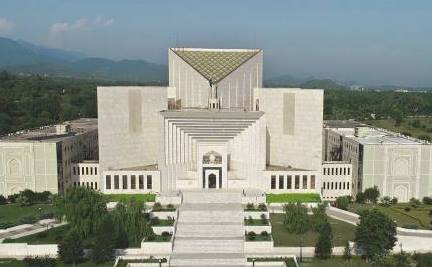ISLAMABAD – The Supreme Court’s (SC) constitutional bench raised questions regarding whether the entry of people into the Corps Commander’s House on May 9 constituted a security breach and whether any resistance was shown during the incident.
The Supreme Court’s constitutional bench, headed by Justice Amin-ud-Din, raised the question while hearing the intra-court appeal challenging the trial of the civilians in the military courts.
During the proceedings, Khawaja Haris, counsel for the Ministry of Defence, presented his arguments.
Khawaja Haris stated that the trial of the civilians in military courts is not a sudden development, as the law has existed since 1967. He cited the F.B. Ali case, where individuals tried were retired personnel.
He added that even during peacetime, civilians interfering in military affairs can be tried in military courts.
At this, Justice Hassan Azhar Rizvi remarked that the F.B. Ali case took place during a civil martial law era.
Justice Hassan Azhar Rizvi further asked whether any military officer was tried in connection with the events of May 9.
He asked, “People reached the Corps Commander’s House on May 9. Their entry into the premises is undoubtedly a security breach. It is not necessary to resort to firing, but when military installations were damaged on May 9, was there any resistance?”
In response, the Ministry of Defence’s counsel stated that the allegations against the protesters involve causing damage to property.
He added that no military officer was charged in connection with the May 9 incident, and complete restraint was observed to avoid any loss of life.
Later, the court adjourned further hearing of the intra-court appeals against civilian trials in military courts until Wednesday (tomorrow).








